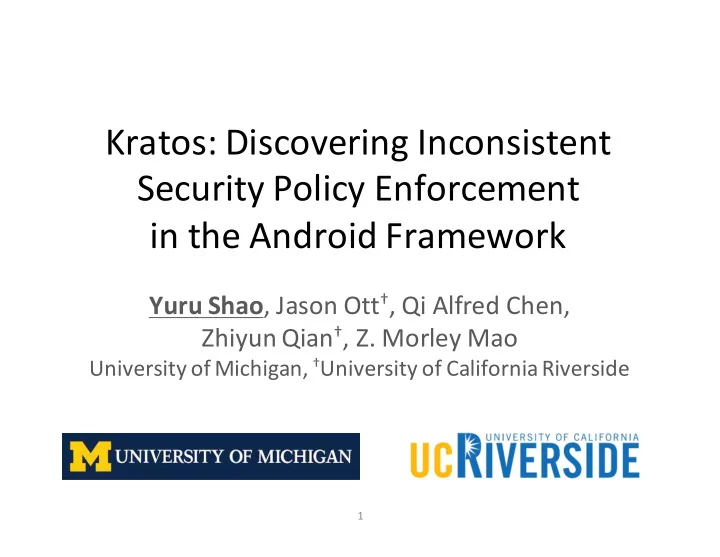

Kratos: Discovering Inconsistent Security Policy Enforcement in the Android Framework Yuru Shao , Jason Ott † , Qi Alfred Chen, Zhiyun Qian † , Z. Morley Mao University of Michigan, † University of California Riverside 1
Security Policy Enforcement • Security policies regulate access to – Sensitive data – System resources – Privileged operations • Policies need to be correctly enforced 2
Inconsistencies exist • According to the Android documentation – apps that hold a CALL_PHONE permission can end phone calls Telecom Service Telephony Service (1) endCall() (2) endCall() (3) onReceive() Check SYSTEM Check CALL_PHONE No security check! Privileged Methods The enforcement of a security policy on different code paths can be inconsistent 3
Security implication • Privilege escalation Exploiting Inconsistencies Request fewer permissions. 4
Security implication • Privilege escalation Exploiting Inconsistencies Besides app permissions, attackers can also bypass system permissions Request fewer permissions. 5
Inconsistent security policy enforcement • Also found in SELinux and Xen 1 – Unauthorized user account access – Permanent data loss • No solution for the Android framework – Prior work is OS specific – Android has no explicitly defined policies [1] Lin Tan et al. AutoISES: Automatically Inferring Security Specification and Detecting Violations. USENIX Security 2008. 6
Problem statement • Focusing on the Android framework, we answer the following question: – How can we systematically detect inconsistent security policy enforcement without any knowledge of the policies? 7
Our approach • Discover app-accessible service interfaces that have overlaps in functionality – They’re expected to have consistent security enforcement • Perform a differential analysis on security checks that two overlapping interfaces employ 8
Differential analysis storeSMS(...) storeMMS(...) enforcePhone() ... … � {RADIO} storageProvider enforcePhone() checks if the caller’s UID is 1001 (RADIO) 9
Pruning storeSMS(...) storeMMS(...) String.equal(...) ContentValues.put(...) enforcePhone() ... … � {RADIO} storageProvider enforcePhone() checks if the caller’s UID is 1001 (RADIO) 10
App-accessible service interfaces • Analysis scope: system services – System services perform enforcement • Service interfaces – AIDL methods – Broadcast receivers App WiFi Service add add startScan startScan Binder IPC ... ... broadcasts AIDL: Android interface definition language 11
Security checks • Security enforcement: a set of security checks • We formulate four types of checks – Permission check – UID/PID check – Package name check – Thread status check 12
Kratos Design Explore the codebase to find Java Class Pre-processing All system services & interfaces • Files Look at service registration • Build a precise framework call graph Call Graph Points-to analysis • Construction IPC shortcuts • Relevant Call Graph Identify security checks applied to Security Annotation each node (method) Check Types 1. Permission Inconsistent Inconsistency 2. UID/PID Security 3. Package name Detection Enforcement 4. Thread status Compare security enforcement of Ranked list for manual service interfaces if they investigation 13 • Call the same privileged methods
Implementation • Support AOSP and customized frameworks – Obtain Java classes from • Intermediate building output (AOSP) • Decompiled dex files (customized) • Build a precise framework call graph – Points-to analysis using Spark – An artificial, static entry point including all app- accessible service interfaces • Perform data flow analysis – Identify security check methods – Collect system services 14
Evaluation • 6 different Android codebases – AOSP 4.4, 5.0, 5.1 and M Preview – HTC One, Samsung Galaxy Note 3 • Accuracy Codebase # Inconsistencies # TP # FP Precision # Exploitable Android 4.4 21 16 5 76.2% 8 Android 5.0 61 50 11 82.0% 11 Android 5.1 63 49 14 77.8% 10 M Preview 73 58 15 79.5% 8 AT&T HTC One 29 20 9 69.0% 8 T-Mobile Samsung Galaxy 128 102 26 79.7% 10 Note 3 15
False positive and exploitability • False positives exist – Two interfaces are not equivalent in functionality – Points-to analysis produces over-approximated results • Not all inconsistencies are exploitable – Difficult to construct valid arguments – Difficult to trigger particular privileged methods 16
Vulnerabilities discovered • We found 14 vulnerabilities Previously reported or fixed Zero-days • 5 out of 14 affect all codebases • Bug reports confirmed by Google – Results website: http://tinyurl.com/kratos15 17
Case study 1 • Bypass system permission to change HTTP proxy settings Documented in Hidden, undocumented Android SDK udpateNetwork(conf) save(conf) Check Check CHANGE_WIFI_STATE CHANGE_WIFI_STATE CONNECTIVITY_INTERNAL ACCESS_WIFI_STATE CONNECTIVITY_INTERNAL is 4.4.2_r1. a system permission Fixed in Android addOrUpdateNetworkNative(conf) 5.0.0_r1 • Allows attackers to bypass the system permission • MITM, eavesdropping, traffic interception, … 18
Case study 2 • Send arbitrary requests to the radio hardware without any permissions PhoneInterfaceManager PhoneInterfaceManagerExt (Samsung-customized) invokeOemRilRequestRaw(r) sendRequestRawToRIL(r) Check CALL_PHONE No security checks! Radio Interfaces • Allows attackers to send arbitrary requests to radio on vulnerable Samsung phones • Send SMS, make phone calls, … 19
Other observations • 11 vulnerable interfaces are hidden to apps – Not available in the Android SDK – Invoke using Java reflection • AOSP frameworks – New system services introduce new inconsistencies, leading to new vulnerabilities • Customized frameworks – Samsung added many system services • Introduced 2 additional vulnerabilities • One present in AOSP was fixed 20
Conclusions • Inconsistent security policy enforcement gives rise to many vulnerabilities • Our tool is practical and useful for AOSP, vendors, and carriers • Our approach is general and can be applied to other systems • To ensure system security, the implementation must faithfully realize the design 21
Q&A • Thank you! 22
Recommend
More recommend